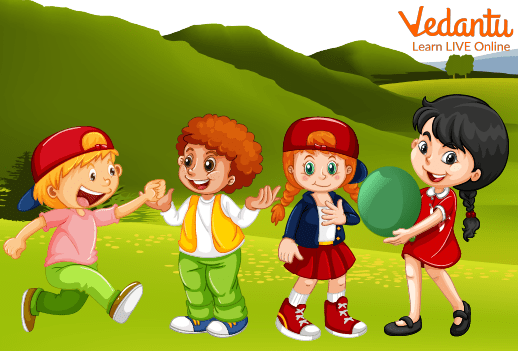Fun Nursery Rhymes
Children enjoy the rhymes taught in kindergarten. They learn and make their own amazing English rhymes list that they are fond of. The children's songs are often inspiring, amusing, and interactive. All of these nursery rhyme songs, however, have one thing in common: even the tiniest singers love them. Kids are going to learn interesting rhymes here.

Children
Fun: Fun with Nursery Rhymes
Most nursery rhymes follow a similar plot to a happy ending with a fixed start and end. This teaches children that things happen in a certain order, and they begin to understand and follow along with stories. Nursery rhymes employ patterns and sequences, allowing children to learn basic Math skills while reading them aloud.
Nursery rhymes give limited learning opportunities for young children, and they can often be the main reason for hours of creative and open-ended play. They are a valuable early education source of information because they allow children to become interested in the rhythm and patterns of language.
Common Nursery Rhymes
A few common nursery rhymes are given here with their interesting pictures and the English rhymes list of those is:
Birthday Poem for Kids
Twinkle Twinkle Little Star
Baa Baa Black Sheep
Chubby Cheeks
Early to Bed
Birthday Poem for Kids
"Frozen Ice Cream and Jelly,
Whistles and balloons,
Yelling and singing,
Rhymes and tunes,
Gifts and surprises -
Fun things to do!
It's time now to wish
HAPPY BIRTHDAY TO YOU!"

Happy Birthday Celebration
Twinkle Twinkle Little Star
Twinkle, twinkle, little star,
How I wonder what you are,
Up above the world so high,
Like a diamond in the sky,
Twinkle, twinkle, little star,
How I wonder what you are.

Twinkle Twinkle Little Star
Baa Baa Black Sheep
Baa, baa, black sheep,
Have you any wool?
Yes, sir, yes, sir,
Three bags full;
One for the master,
One for the dame,
And one for the little boy
Who lives down the lane.

Black Sheep
Chubby Cheeks
Chubby cheeks, dimple chin
Rosy lips, teeth within
Curly hair, very fair
Eyes are blue, lovely too
Teacher's pet, is that you?
Yes! Yes! Yes!

Chubby Cheeks
Early To Bed
Early to bed
Early to rise
Makes a man
Healthy
Wealthy
and Wise.
Early to bed
Early to rise
Makes a man
Healthy
Wealthy
and Wise.

Early to Bed Rhyme
Summary
Children's songs and nursery rhymes help them to become more phonetically aware, which enhancing their understanding of syllables of words, reading, and writing abilities. Some interesting and short nursery rhymes are discussed above. These children's rhymes aid in the teaching of fundamental concepts and enhance children's capacity for understanding and following instructions. These children's songs are excellent for teaching the alphabet, numbers, shapes, and various other concepts.


FAQs on Short Nursery Rhymes for Children
1. What role do nursery rhymes play?
Children can learn important developmental skills in bite-sized portions through nursery rhymes, which more often serve as the motivation for endless hours of creative play. They help children develop an interest in the rhythm and patterns of language and are an effective early reading and learning tool.
2. How to introduce a nursery rhyme in the classroom?
Firstly, choose a simple rhyme to go along with one of your daily activities, such as a walk to the playground or a craft project. Share rhyming picture books with your children. Encourage the children to talk about the characters and events that unfold within the rhyme by sharing picture books of rhymes with them.
3. Which nursery rhyme is the most well-known?
Most children enjoy singing, listening to, and dancing to music. Simple finger plays work well with the youngest children. They're short, have rhyming words, and get the kids involved in the music.
Following are the famous nursery rhymes-
Twinkle, Twinkle Little Star
Row, Row, Row Your Boat
Humpty Dumpty
Wheels On The Bus
4. How do rhymes in nursery books help with language development?
Repeating rhymes and stories helps the brain develop memory skills and teaches language functions. When learning new words and in reading comprehension, nursery rhymes help in the development of reasoning skills.
5. Complete the sentence. Early to bed and ………………………..?
The complete sentence will be Early to bed and early to rise.





